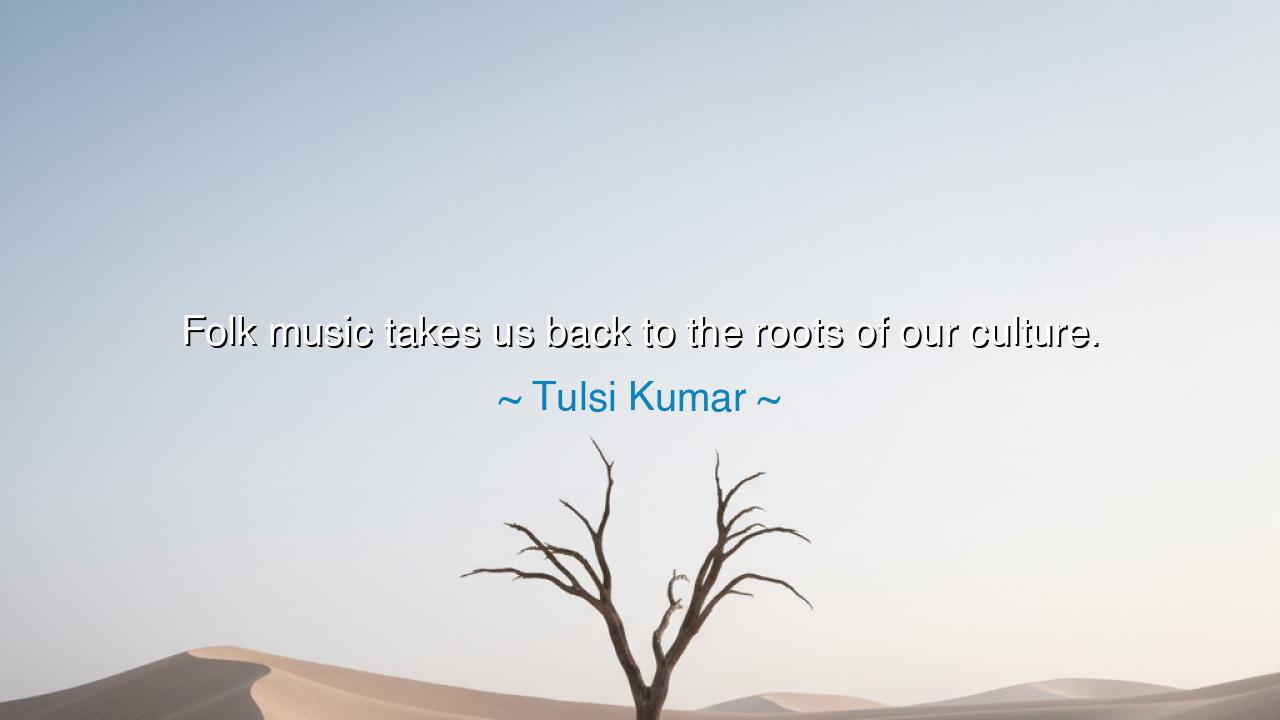
Folk music takes us back to the roots of our culture.






When the singer Tulsi Kumar declared, “Folk music takes us back to the roots of our culture,” she spoke as one echoing the wisdom of the ancients. For folk music is not born of polished halls or gilded instruments—it rises from the soil, from the toil of farmers, from the voices of mothers, from the laughter of festivals, from the cries of sorrow. It is the sound of a people remembering who they are. To hear folk music is to walk back along the paths of our ancestors and feel the pulse of their lives beating still within us.
The ancients knew that memory was sacred, and they wove their memories into songs. Before there were books, there were ballads. Before there were chronicles, there were chants. Villages carried their stories not in parchment, but in melody. A shepherd’s tune told of the hills he roamed; a fisherman’s song echoed the sea he braved; a mother’s lullaby carried the dreams of her child. In every land, across every tongue, folk music preserved what history could not— the daily breath of a culture. Thus, as Tulsi Kumar proclaims, to listen to it is to return to our roots, to remember not just events, but the spirit of a people.
Consider the example of Ireland, whose people endured famine, exile, and oppression. Their folk songs, filled with haunting pipes and sorrowful fiddles, carried their story across oceans. Songs like Danny Boy or The Parting Glass became not just entertainment, but vessels of memory and identity. For the Irish scattered across the world, these songs were a link to home, a reminder of who they were. Without their folk music, much of their culture might have been lost to silence. But through song, their roots endured.
In India, too, this truth resounds. The villages sing with bhajans, with folk ballads, with harvest songs, each one carrying the weight of centuries. These melodies, often simple and unadorned, hold within them the rhythm of fields, the devotion of worship, the tales of love and longing. Even as modern music rises in cities, the heart of India beats still in the voices of its villages. This is the eternal power of folk music: it does not die with time, but adapts, travels, and reminds every generation of its foundation.
The meaning is clear: folk music is not just sound, but identity. It tells us who we are, where we came from, and what shaped us. In an age of fleeting trends and global voices, it anchors us in our culture, reminding us that we are not rootless wanderers, but heirs of a long story. Without it, we risk forgetting ourselves, becoming strangers in our own land. With it, we stand firm, nourished by the roots that feed us.
The lesson for us is this: honor your folk songs. Do not dismiss them as old or simple, for in them lie the treasures of your past. Learn them, sing them, share them with your children. Let them not be forgotten in dusty corners while modern noise drowns them out. For if a tree forgets its roots, it will fall; if a people forget their songs, they will wither. To preserve folk music is to preserve your very soul.
Practical wisdom follows. Attend festivals where folk traditions are sung. Seek recordings of the songs of your land. Ask your elders to sing, and listen with reverence. If you are an artist, weave these melodies into your work, so that they live again in new forms. And above all, do not let the chain be broken: pass them forward, so that when you are gone, your children may still hear the voices of their ancestors through song.
Therefore, let us hold fast to Tulsi Kumar’s words: “Folk music takes us back to the roots of our culture.” For in those roots lies our strength, our memory, our unity. A people without song is a people without soul. But a people who remember their music will endure, no matter how the winds of time may blow.






AAdministratorAdministrator
Welcome, honored guests. Please leave a comment, we will respond soon